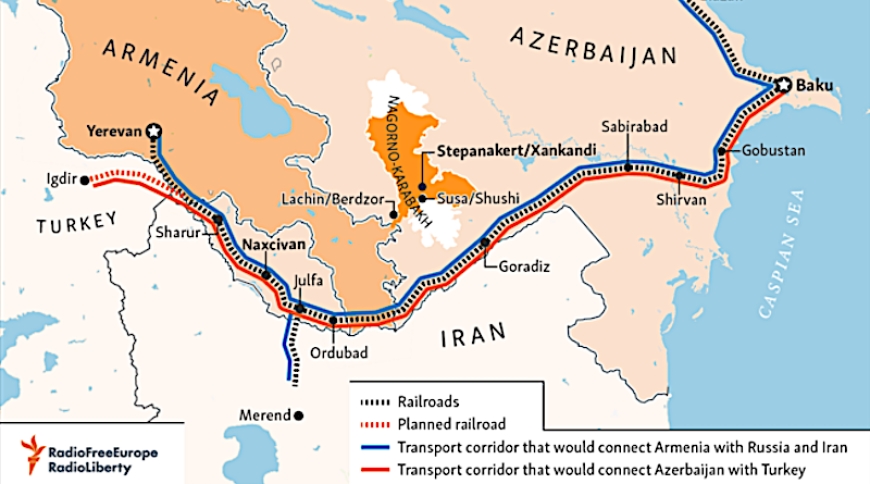Azerbaijan’s Dangerous Game: How the Zangezur Corridor Threatens Peace in the Caucasus

In the theater of geopolitical chess, Azerbaijan’s recent machinations reveal a darker ambition, one that threatens to alter the fragile equilibrium of the Caucasus region. The Zangezur Corridor, presented under the guise of a “trade route,” is little more than a veiled attempt to redraw borders and shift regional power dynamics in Azerbaijan’s favor, with Turkey and Russia playing enabling roles in this dangerous game.
The calculated push for the opening of the Zangezur Corridor represents Azerbaijan’s audacious move to consolidate its influence, effectively isolating Iran and Armenia in the process. But this is not just a matter of simple geopolitics; it is a blatant attempt to undermine the sovereignty of neighboring nations while masquerading under the rhetoric of economic development.
At the heart of this matter lies the sinister intention to redefine borders, a strategy that Azerbaijan has pursued with unwavering focus. By disguising the Zangezur Corridor as a mere “trade route,” Baku seeks to incrementally transform it into a political tool, one that will cement Azerbaijan’s hold over key territories in Armenia. This is not just speculation—both Turkey and Azerbaijan have shown their cards, with Ankara backing Azerbaijan’s claims in the hope of furthering its neo-Ottoman ambitions in the region. For Turkey, the Zangezur Corridor represents a vital connection to the Turkic world, bypassing Iran and strengthening its own geopolitical position.
Iran, meanwhile, finds itself cornered, with a red line drawn in the sand. Tehran has made its opposition to any redrawing of borders abundantly clear. Iran’s resistance, however, is not just about borders; it’s about survival. By establishing this corridor, Azerbaijan threatens to bypass Iran economically, cutting it out of lucrative trade routes and diminishing its standing as a regional power. The so-called Zangezur Corridor could ultimately deprive Iran of vital transit revenues, further crippling its already embattled economy. Moreover, the geopolitical marginalization of Iran would weaken its leverage in both the Caucasus and Central Asia.
In the meantime, Russia, Azerbaijan’s latest partner, is complicit in this duplicitous scheme. Vladimir Putin’s silence on the matter and Moscow’s tacit support for the corridor suggest that Russia views Azerbaijan as a more reliable ally than the embattled Armenia or an increasingly isolated Iran. Moscow’s motivations are clear: as Armenia inches closer to the West, Russia is shifting its allegiance to those who can guarantee more immediate economic and political rewards. In this case, it’s Azerbaijan and Turkey, both of whom hold key strategic cards.
For Russia, this corridor provides a convenient means to extend its influence while avoiding direct confrontation with the West. Yet, this shortsighted approach ignores the long-term costs. By enabling Azerbaijan and Turkey’s dominance in the region, Moscow is effectively reducing its own leverage. The Zangezur Corridor is nothing less than a Trojan horse that will come back to haunt the Kremlin.
Iran cannot afford to remain passive. The Zangezur Corridor is an existential threat not only to its economic interests but also to its geopolitical standing. Tehran must engage in a multi-pronged approach to safeguard its borders and its influence in the region. Iran’s protestations alone will not suffice; it must take decisive action to prevent Azerbaijan from becoming the de facto power broker in the Caucasus.
Moreover, Iran must pressure Russia, making it clear that any further cooperation with Azerbaijan and Turkey will come at a steep cost. Tehran cannot afford to let Moscow believe that its betrayal will be forgiven. Iran’s political and military leverage in the region, coupled with its strategic alliances, must be deployed with full force. Passive diplomacy and hollow protests are a recipe for disaster.
Iran should also accelerate the development of its own infrastructure and trade routes, presenting viable alternatives to those who would otherwise flock to the Zangezur Corridor. By modernizing its transit capabilities and fostering greater economic ties with Southeast Asia and Europe, Iran can not only preserve its regional relevance but also send a clear message to its adversaries: it will not be sidelined.
Ultimately, Azerbaijan’s ambitions, bolstered by Turkey’s expansionist agenda, pose a direct threat to regional stability. The Zangezur Corridor is not just a road; it is a pathway to conflict. By disregarding the delicate balance of power in the Caucasus, Azerbaijan risks plunging the region into chaos. Armenia, already weakened by years of conflict, may not withstand this pressure for long. Should the borders be redrawn, the ramifications will reverberate far beyond the region, drawing in global powers and igniting new flashpoints.
The world must wake up to Azerbaijan’s duplicitous strategies before it’s too late. The Zangezur Corridor, if allowed to proceed unchecked, will not only undermine the sovereignty of its neighbors but will also destabilize the entire region, empowering autocratic regimes at the expense of peace and stability.
In the end, Azerbaijan’s reckless gamble is a reminder that unchecked ambition is a perilous force—one that will not stop until the maps are redrawn and the region is irrevocably altered. The time for action is now, before Azerbaijan’s ambitions reshape the Caucasus in ways that benefit only the few, while the many are left to suffer the consequences.













































